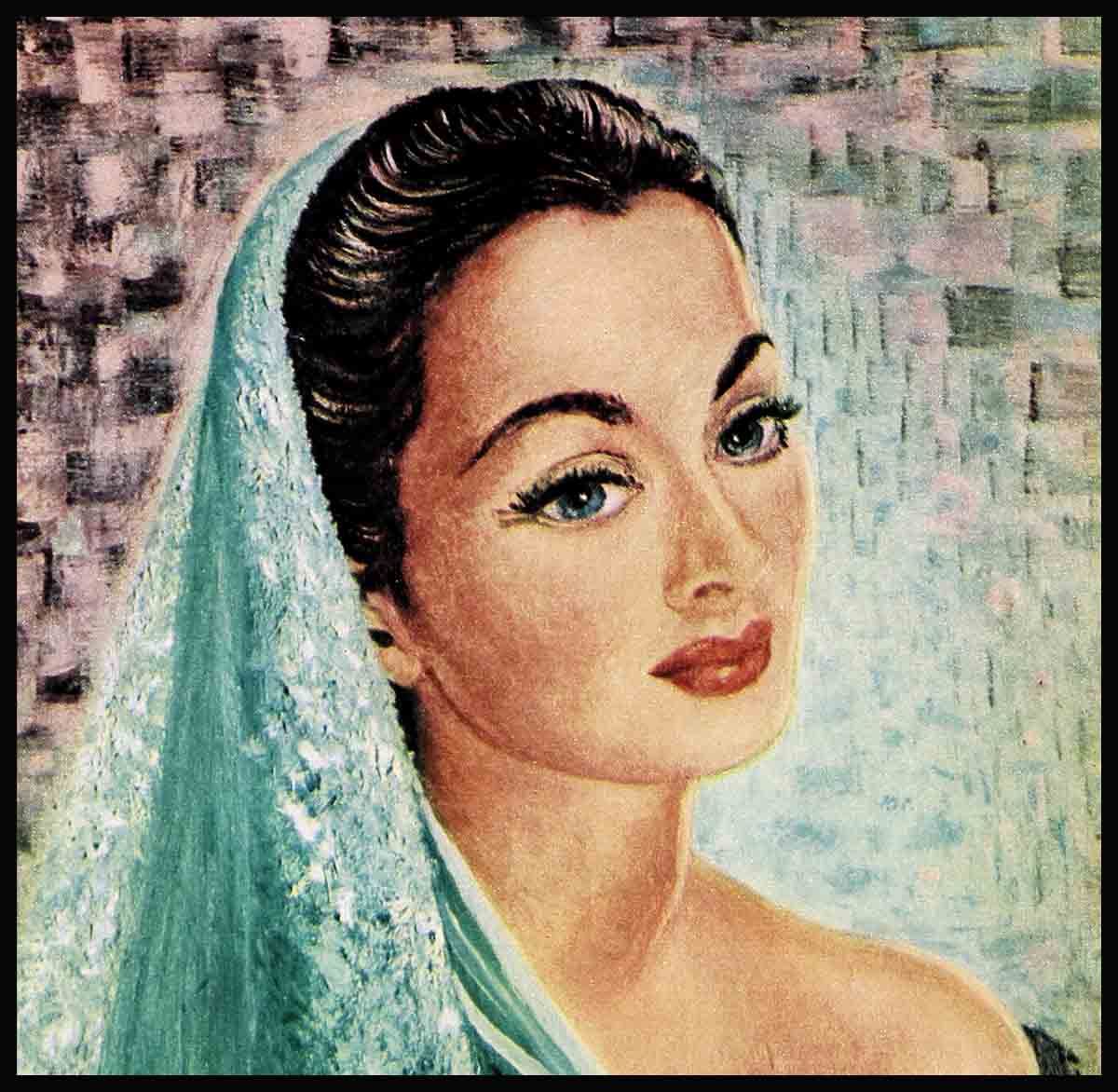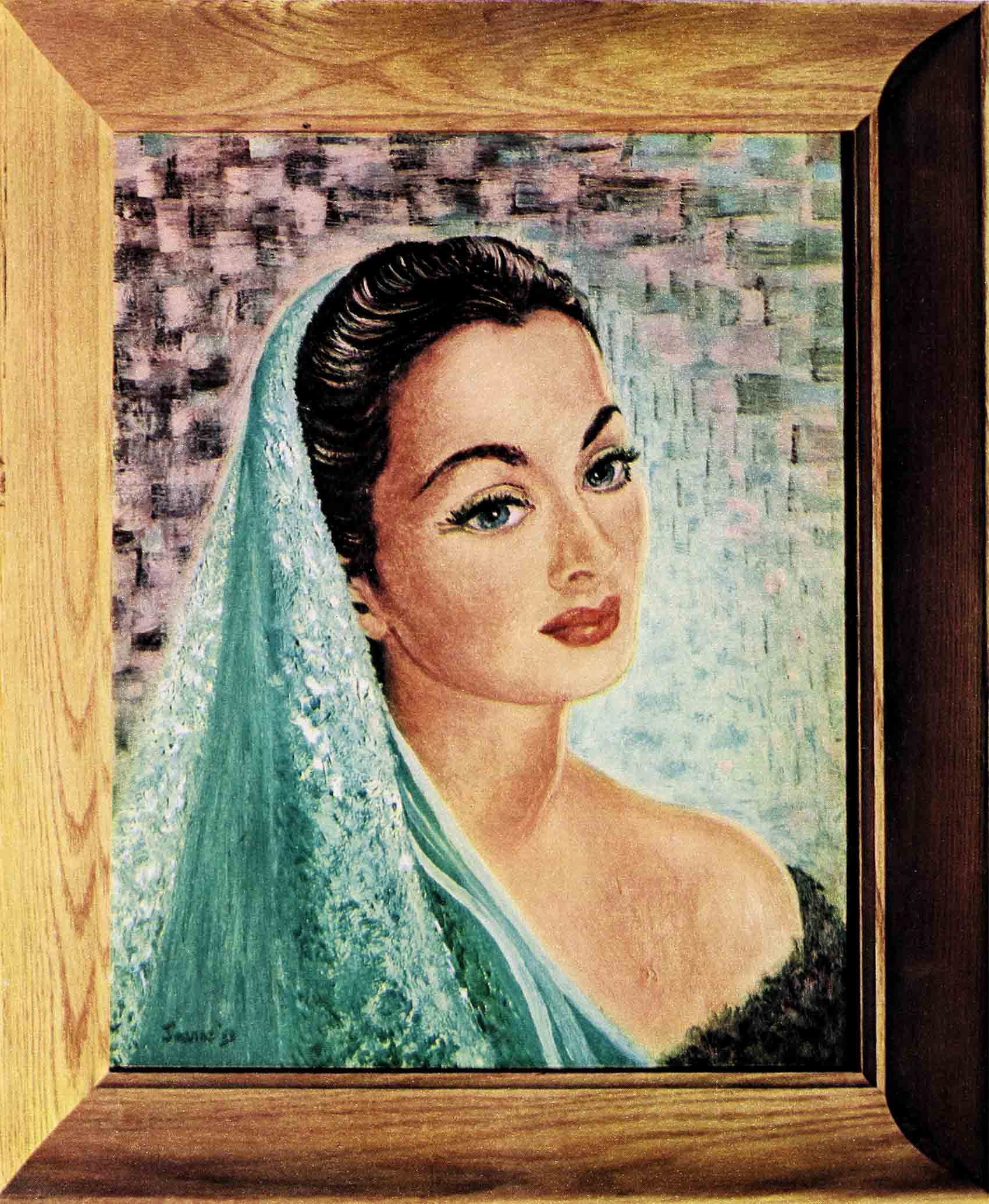
Portrait Of Ann Blyth
When I painted the portrait of my good friend Ann Blyth McNulty to accompany this story in Photoplay, she had something less than two months to wait for her first baby.
Ann has always been a beautiful girl but in those last weeks before her child was to be born she was particularly radiant, aglow—as many pregnant women are when they have yearned for children and are at last fulfilled—with something more than mere physical beauty. It was as if her very soul were shining.
On that night, Ann showed me the wonderful blue and yellow nursery she has created, delightedly pointing out the blue wallpaper with silver angels, the fluffs of pale yellow curtains at the gabled windows. And one by one she took out the wonderful little things she had prepared for her firstborn, the glamorous presents from all the gay showers, the more practical essentials which she had shopped for herself. She was so excited!
There’s no time for any wife, of course, more thrilling than the months before she gives birth to her first child. I remember that myself. The later times are happy times, too, but once the first miracle is over, you can be more matter of fact the second time, or the third, or the fourth. Even so I’ve never seen a mother-to-be quite like Ann. It was completely in character, of course. I’ve never known a girl quite like her, under any circumstances.
Most women who have had Ann’s brilliant success and acclaim could be forgiven, I think, for being just a little bit cynical, just a touch jaded. But not Ann. That’s the really wonderful thing about her. She greets each new life experience with almost childlike wonder, enthusiasm and sheer bubbling joy.
This is why, when we met quite casually at some big, impersonal industry affair seven and a half years ago, I felt a sudden sense of affinity with this girl. And that feeling of closeness has grown with the years. We have never worked together, have never, as a matter of fact, worked at the same studio at the same time. But we have had a close, warm friendship all these years, a rare kind of friendship in this fiercely competitive town of ours.

We have held nothing back from one another, so I knew long ago, many years before she found her Dr. Jim McNulty and married him in one of the most moving wedding ceremonies J have ever seen, that what Ann wanted more than anything else in the world was a husband, a home of her own and children. Lots of children. I already had much of what Ann wanted even then, because Paul and I had been married for several months when we first met Ann. Little Paul already was on his way. And we had our first Home of Our Own. (All of you who have acquired it will know why I use the capitals.) We had what Ann wanted most. She didn’t envy what we had—envy is just not a part of her make-up—but she valued it. And because she valued it and we valued it, we wanted it for her.
I worried a lot about Ann in those early years of our friendship. I wonder if she knows how much.
She was working so hard at her career that I was afraid she was almost putting off her personal life.
She seemed to be giving too much of herself, her time and her energy to her work and her charities—her church and a thousand and one other organizations have known for a long time that Ann Blyth is a girl who can’t say no—that she had no time left at all just for herself, to go out for an evening with a man, for instance, just for fun. I was afraid she would miss her Right Man, that he would come along and Ann would be too busy to notice.
Ann knew this, too. She knew it all along, and I needn’t have worried. None of those men I introduced her to, hoping to make a match, was the Right Man. She was, as always, sweet and polite, but apart. When Jim McNulty walked into her life one day about a year and a half ago, Ann recognized him as the Right Man at once, and he was her man, the only man, right from the start. I’m glad for her; she deserved to find him.
Those early years, when I fretted so unnecessarily about her, she wasn’t anxious. She was waiting, calmly and confidently. She knew exactly what she wanted, and she wanted it enough to know in her heart she would not be denied it.
I remember—I shall never forget—the night when I first realized the urgency of her longing. It was Christmas Eve, almost seven years ago, Little Paul’s first Christmas. He was just nine months old. Paul and I had just moved into our new home, and we were so dizzy with pride and joy that we wanted to share our happiness. We put the last bright bauble on the Christmas tree, lit the first fire in our brand-new fireplace and then threw open the big front door to say welcome to a dozen or so of our very closest friends and relatives.
Ann came alone, looking like a Christmas angel fit to deck a tree herself, and sat quietly drinking it all in—the happy family scene, the aroma of spruce and candles. Little Paul recognized her at once as a friend. She has an affinity for children, and they know it. They move to her as though magnetized.

She held Little Paul in her arms that night and sat with him at the foot of the Christmas tree, and after awhile she began to sing, all the old, familiar Christmas carols, in that sweet, pure voice of hers. It was the first time that we had known what a beautiful voice she had. She had been. studying quietly and had never sung in public.
No one talked. Little Paul was silent, hypnotized. It was a magic night.
She handed the baby back to me when it was time for him to go to bed. “Thank you,” she said. A little later, she slipped away—alone, again.
Paul and I talked about her late that night.
“She has to find it,” I said, with real urgency. “She has to find it, just as we have found it.”
Ann had to wait, five long years, but she did find it. Her man, her place in life as mistress of her own home. And now, so soon, just as Paul and I were blessed so soon, the beginning of her family.
As you probably know, Ann’s baby was born June 10th, a happy, seven-and-a-half pound beautiful boy named Timothy Patrick McNulty. Ann was conscious throughout and saw everything, as I honed she would because it will make her baby even more dear to her. Father Jim was just like any other expectant father—obstetrician or not. He sat down, stood up, paced the floor and sat down again. He didn’t go into the delivery room but forced himself to watch the proceedings through the glass window as Dr. Bernard Hanley, Jim’s partner, delivered little Timothy Patrick.
Less than half an hour later, Ann was returned to her room in a lively mood, and later the baby was brought in to her for feeding. That is perhaps the happiest time in a mother’s life—holding her baby and feeding it for the first time—and Ann must have felt the same sense of fulfillment and achievement I felt. Little Timothy curled close to his mother and kept falling asleep as she fed him—a happy, contented baby who knew his life would be filled with love and security.
I can predict out of my own rich experience some of the emotions Ann will experience in the next few months. She will be blissfully happy with her baby—fulfilled as never before. She will be calm, and accepting, and he will be calm in return and content. I doubt if any baby of Ann’s will have colic or feeding problems.
Ann will have a fresh spurt of gratitude—as I did—in the first few weeks after she brings her baby home that she had the good sense to marry a man a few years older than she is. Jim McNulty is ten years older than Ann, and I’m so glad. I remember what it meant (Paul is seven years older and I was an ignorant infant of nineteen when we were married) to have a husband who was mature enough to take small crises in stride when the first baby was little.
After a few months Ann will have the experience—painful at first—of seeing her impeccably perfect French provincial house “antiqued.” Not by design—by her baby’s experiments. But she will relax after a bit and enjoy it, knowing that you can’t live the elegant life with toys in the living room. But who wants to?
Ann will be torn, as I have been torn, when first she has to leave her child in the care of others to go back to her work. She will keep her commitment to sing at the Sahara in Las Vegas six short weeks after her baby is born because she is conscientious about commitments. For the first three hours of the engagement, perhaps, she will find it stimulating and satisfying. And then she will start wondering what the baby is doing, and how he is changing—and with his Mother away from home!—and she will work with only half of her heart. I know. Paul and I left all of our children last year to go to Africa, where I made “Duel in the Jungle,” and two hours after our plane left Los Angeles I was tortured with homesickness.
Ann will go through this, and like me, I am certain will vow never to go away without her child again. I am developing a phobia about separating my group. She will too, and she will agree with me (rationalizing?) that children need the experience of seeing different parts of the world and different kinds of people, that their security, their home is wherever their parents are.
Her work will never again be as all absorbing to Ann as it was before she married Jim. She will always act, as I will, for both of us need this too to be complete. But never again will the job as an actress be her most important job. She will give it only a part of her heart.
“A part of a happy heart,” I want to say to her, “dear Ann, is enough.” You and Jim, like Paul and I, will be satisfied with moderate material success, we don’t want the biggest houses in town or the flashiest swimming pools.
We want to work, because work is growth—but so is love and marriage and children and home.
I am so glad, dear Ann, that you have found them.
THE END
—BY JEANNE CRAIN
It is a quote. PHOTOPLAY MAGAZINE SEPTEMBER 1954




